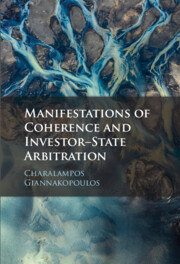Book contents
- Manifestations of Coherence and Investor–State Arbitration
- Manifestations of Coherence and Investor–State Arbitration
- Copyright page
- Contents
- Preface and Acknowledgements
- Table of Cases
- Table of International Conventions
- Table of International Investment Agreements
- Table of Procedural Rules
- Abbreviations
- Introduction
- 1 The Content of Coherence
- 2 Coherence and Legal Reasoning
- 3 Two Models for Coherence
- 4 Coherence and the Interpretation of Treaties
- 5 Coherence and Analogical Reasoning
- 6 Coherence as Reflexivity
- 7 Coherence as Moral Responsibility
- Coda
- Epilogue
- Bibliography
- Index
2 - Coherence and Legal Reasoning
Published online by Cambridge University Press: 13 December 2022
- Manifestations of Coherence and Investor–State Arbitration
- Manifestations of Coherence and Investor–State Arbitration
- Copyright page
- Contents
- Preface and Acknowledgements
- Table of Cases
- Table of International Conventions
- Table of International Investment Agreements
- Table of Procedural Rules
- Abbreviations
- Introduction
- 1 The Content of Coherence
- 2 Coherence and Legal Reasoning
- 3 Two Models for Coherence
- 4 Coherence and the Interpretation of Treaties
- 5 Coherence and Analogical Reasoning
- 6 Coherence as Reflexivity
- 7 Coherence as Moral Responsibility
- Coda
- Epilogue
- Bibliography
- Index
Summary
This chapter establishes the strong link between coherence and legal reasoning. In so doing, it draws three main conclusions. A first conclusion is that legal reasoning is an instance of practical reasoning and practical deliberation. What this means, ultimately, is that when one reasons and argues about the content of the law one does not seek to discover truth in the same sense as when forming an opinion about the way things are in nature. Rather, the aim is to formulate a reasoned opinion and commit oneself to a specific course of action given the presence of a legal problem. A second conclusion is that, when understood as practical reasoning, legal reasoning exhibits certain coherence-related features. These are: (i) a web-like structure; (ii) the fact that rationality in legal reasoning does not depend only on logic but also on plausibility (or fit); and (iii) a purposive nature. A third conclusion is that coherence acts as a substantive and a methodological principle during legal reasoning, thus further confirming the dual dimension of coherence identified in Chapter 1.
Keywords
- Type
- Chapter
- Information
- Publisher: Cambridge University PressPrint publication year: 2023



